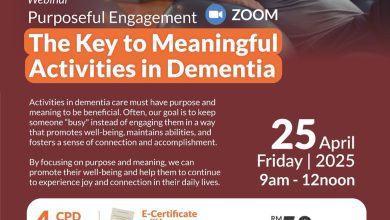Embracing the Golden Years: Cultivating Mindful Gratitude for a Fulfilling Life


By Dr Mugilarasi Arasarethinam
Aging is a natural process that starts at birth and ends with our last breath. Turning 60 and beyond may feel daunting for those who reach that age. However, the main challenge with aging is our lack of preparedness for this stage of life. Despite growing up around older people, we often find ourselves caught by surprise when we experience the stage ourselves.
Most of the time at this alleged “old age”, we grapple with regrets over lost youth—wondering how it passed by so quickly and where all the time went. We may also fear the unknown future, anticipating impending limitations and the proximity of mortality drawing near.
This lack of preparation and acceptance leads to a sense of unrest, causing many to spend their later years in anxiety and depression while facing the physical limitations that come with aging. This, in turn, creates a less pleasant experience of aging, impacting what we call the quality of aging.
The World Health Organization (WHO) defines active aging as the ability for older adults to lead a life where opportunities for health, participation, and security is optimised. WHO is actively working to facilitate this through various policies and programmes.
While improving the external environment—such as social support and addressing social issues related to aging—is crucial, we must also focus on the inner world of the aging individual. It is essential to teach them how to cultivate a healthy attitude toward aging.
In Dharmic traditions, life is said to be divided into different phases, each with its own Dharma. Dharma refers to the natural laws and duties of life. Living in alignment and harmony with this Dharma reduces resistance, allowing us to enter a state of flow and create a positive and pleasurable experience. The Dharma of old age is a phase for seeking wisdom. This demands values such as turning inward, embracing acceptance, living in the moment, and practicing generosity.
Practices that cultivate these values can help develop an attitude of mindful gratitude. Though mindfulness in older adults can be challenging to instil, it has proven benefits, including reducing inner inflammation that contributes to accelerated aging and age-related diseases. Additionally, addressing the psychological stress of loneliness and isolation as it can lead to mental health issues if left untreated.
An attitude of gratitude, when practiced, enhances happiness, promotes social interaction, and even lowers cholesterol levels and the risk of cardiovascular diseases. Combined mindfulness and gratitude, practiced diligently, especially in advanced age groups can help reinforce autonomy over their wellbeing and improve the quality of life. From this place of independence, they can find purpose by sharing back generously with the society creating a sense of importance and community. This is then the true essence of active ageing.
We are all headed towards older age, and reaching it is a privilege denied to many. Nevertheless, it comes with its unique challenges. Financial security alone is not enough to navigate this stage. Developing an attitude of mindful gratitude is equally important, and the earlier we start, the better. When our inner world is prepared, we can fully embrace the external support available to us.
Let us begin cultivating this mindset and attitude today, so we can embrace aging with love and share the experience generously. Aging is not something to fear, but an experience to be embraced. The time to start is now.
Dr Mugilarasi Arasarethinam is a Hub Leader of the Active Ageing Impact Lab at Taylor’s University. The lab aims to promote a fulfilling and meaningful life for senior citizens in their golden years by helping them achieve financial security, maintain physical and mental health, have access to quality care services, as well as to engage in lifelong learning.


